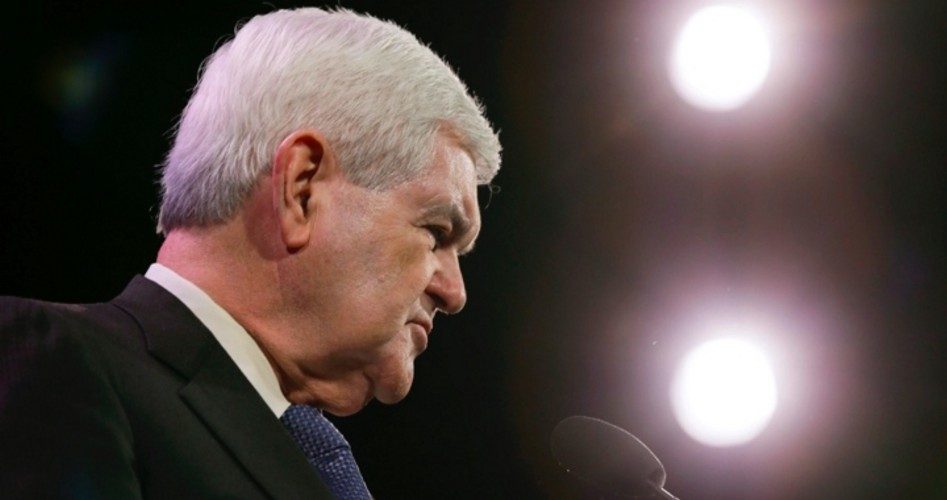
Although he’s found that ObamaCare isn’t all it’s cracked up to be, former House Speaker Newt Gingrich (shown) doesn’t think it should be repealed outright — and, he added, neither do congressional Republicans, notwithstanding their rhetoric to the contrary.
“Even the best estimate for ObamaCare is that at a very high cost it is extending the number of people who are insured by a small number,” Gingrich said during an interview with USA Today’s Jayne O’Donnell at the World Health Care Congress in Washington, D.C., March 25.
Gingrich is correct. As The New American reported in January, the latest Congressional Budget Office projections have the federal government spending nearly $2 trillion over the next decade to insure fewer than half of uninsured Americans.
Moreover, as Gingrich pointed out, most of the increase in coverage has come about by “dramatically expand[ing] Medicaid,” which is an “easy short-term fix.”
“The problem then becomes,” he continued, “who’s going to pay for Medicaid.” (Answer: taxpayers until they are bled dry.)
Another problem with the expansion of Medicaid is that the program already pays well below doctors’ actual costs. That’s why, according to a survey by healthcare-staffing firm Merritt Hawkins, in 2013 only half of family doctors were accepting Medicaid patients. Adding even more people to the Medicaid rolls has only exacerbated the matter: A December report from the Department of Health and Human Services’ Office of Inspector General found that just half of physicians who accept Medicaid patients are taking new ones.
“Having insurance with no doctor may not be better than having a doctor with no insurance,” observed Gingrich.
The individual mandate, too, isn’t quite working as expected, he said, pointing to the fact that “a lot of people are paying the penalty rather than being in the mandate.”
Challenged by O’Donnell about his past support for an individual mandate, Gingrich said that he no longer favors it “because in order to make an individual mandate work, you have to move to an extraordinarily authoritarian system.” Yet Gingrich is known to have stumped for a mandate as early as 1993 — claiming it was the conservative alternative to the complete nationalization of healthcare being pushed at the time by then-First Lady Hillary Clinton — and continued speaking in favor of it until just before he jumped into the 2012 presidential race. Considering that it should have been obvious from day one that enforcing an individual mandate would require authoritarian means, one suspects that politics, rather than principle, have shaped Gingrich’s view of the mandate over the years.
In spite of his misgivings about many aspects of the Affordable Care Act (ACA), Gingrich made it clear that he’s not in favor of repealing it.
“There are a certain number of people from your party that say they just want [the ACA] repealed,” O’Donnell said. “It doesn’t sound like you agree with that.”
“Well, they don’t, either,” replied Gingrich, precipitating a round of laughter from both O’Donnell and the audience. Instead, he said, they’ll just repeal the parts they don’t like while retaining the politically popular ones.
For instance, the individual mandate is unpopular, but the provision forcing insurers to cover all applicants regardless of pre-existing conditions is well-liked, so Congress might want to repeal the former but not the latter. But doing that, he averred, would “create a death spiral in which people never buy insurance till they’re sick” — something that may already be happening with the full ACA in place but could become far worse if it were only partially repealed.
Gingrich, not quite grasping the economic or constitutional issues at stake, then suggested an alternative: “some system that says once you buy your first insurance, as long as you’re paying insurance, you cannot be denied coverage.”
Another popular provision that the GOP probably wouldn’t jettison is the one allowing children to remain on their parents’ health insurance until age 26. “I don’t think it’s repealable,” Gingrich said.
“So,” he continued, “if you actually went down [to Congress] and said, ‘Now, when you say you want to repeal everything, how about these five things?’ you’d suddenly find, well, repeal sort of means repeal but not necessarily repeal, but it’s a kind of repeal that you’d really like because it’s only the parts you want to repeal, it’s not the parts you don’t want to repeal because we’re only going to repeal the things that need to be repealed.”
Gingrich was, of course, being somewhat facetious, but his point is borne out by the GOP’s most recent ObamaCare repeal-and-replace proposal. Unveiled in early February, it calls for, among other things, preventing insurers from denying coverage as long as the covered individual has paid his premiums faithfully in the past, retaining the provision allowing children to remain on their parents’ coverage into young adulthood, subsidizing insurance premiums, and otherwise continuing many of the ACA’s policies with only slight modifications — hence the Washington Post’s reference to the plan as “Obamacare Lite.”
Despite his ongoing posturing as a conservative — Gingrich told O’Donnell that “centralized, bureaucratic solutions are increasingly obsolete” — the former House Speaker remains ever in thrall to command-and-control approaches to solving mankind’s problems. (He even called for a “national brain project” as a way of addressing the growing challenge of Alzheimer’s disease.) Sadly, so do most of his comrades in the Republican Party.
Photo of Newt Gingrich: AP Images



